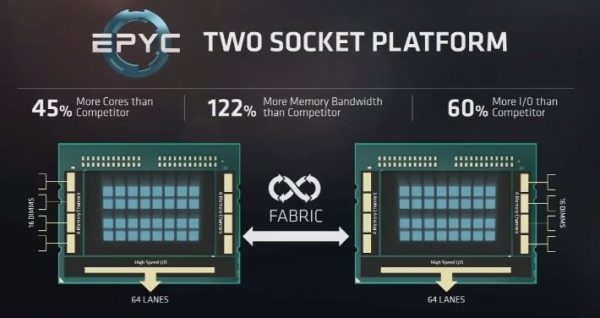It looks like AMD is gaining more traction with its server-oriented EPYC processors. These 32-core Zen-powered behemoths came out of the gate with wide support from tech companies and we even saw Dropbox sign a deal to start using EPYC to power its cloud storage platform. Now, AMD has scored another big partner, with Microsoft signing on to use EPYC processors in its Azure Cloud system.
Microsoft Azure has deployed AMD EPYC processors in its data centers in preparation for its latest series of Virtual Machines for storage workloads. The Lv2 VM family from Microsoft will take advantage of EPYC's high core count and connectivity options. They will use the EPYC 7551 processor, which runs at 2.2GHz with a 3.0GHz single core boost. With support for up to 128 lanes of PCIe connections per processor (EPYC boards can support two), AMD offers 33 percent more connectivity compared to a dual-Xeon solution.
Speaking about bringing EPYC to Microsoft's cloud platform, AMD's GM and VP of Enterprise solutions, Scott Aylor, said: “We are extremely excited to be partnering with Microsoft Azure to bring the power of AMD EPYC processors into their datacenter. There is tremendous opportunity for users to tap into the capabilities we can deliver across storage and other workloads through the combination of AMD EPYC processors on Azure. We look forward to the continued close collaboration with Microsoft Azure on future instances throughout 2018.”
Microsoft's new L-series virtual machines are high I/O, dense storage offerings resulting from Project Olympus. Throughout this project, Microsoft has been working closely with AMD on integrated hardware and that partnership will continue into the future.
KitGuru Says: Microsoft was one of the first companies listed to be supporting EPYC at launch and it seems to have worked out well for AMD. Between this and the Xbox family of consoles, the two companies seem to have forged a strong relationship.
 KitGuru KitGuru.net – Tech News | Hardware News | Hardware Reviews | IOS | Mobile | Gaming | Graphics Cards
KitGuru KitGuru.net – Tech News | Hardware News | Hardware Reviews | IOS | Mobile | Gaming | Graphics Cards



